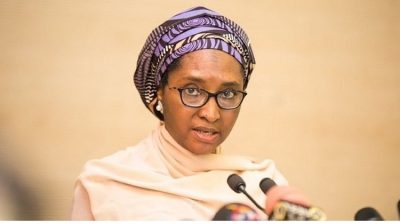Our debts will keep rising, revenues declining – FG

The Federal Government has said it plans to borrow more to fund its budget for 2022, while it will spend more to service the growing debts as a result.
The Ministry of Finance, Budget and National Planning, the Debt Management Office and the Budget Office of the Federation gave the indication at a public hearing organised by the House of Representatives’ Committee on Finance in Abuja on Monday.
The committee had organised the stakeholders’ meeting on the 2022-2024 Medium Term Expenditure Framework and Fiscal Strategy Paper, with which the 2022 Appropriation Bill would be designed.
The Director-General, DMO, Patience Oniha, while explaining some of the points in the presentation earlier made by the Minister of Finance, Budget and National Planning, Zainab Ahmed, noted that the debt stock would keep increasing as revenue is declining.
Oniha said, “I think one of the things that have come out from the presentation from the honourable minister is, much as we have been conservative in projecting revenues, we still see that we are underperforming in revenue.
“So, it means that we are relying increasingly on borrowings to finance the activities of the government. And if you look at the figures from last year when the budget was revised because of COVID-19, we can see that the borrowing levels are going higher.
“So, what that means is that the debt stock as expected will keep rising and debt service will also keep increasing, as shown in the presentation. I just thought I should highlight that this is primarily where the debt stock is growing from, and the debt service, which means that we are also servicing, taking from the revenue which has not grown as expected. I thought I should highlight that because there is a lot of concern about debts. But really, this is the source and we can see the trend.
“So, to respond to your question is to say that we have looked at it; just note some numbers in the MTEF, just looking at where the public debt stock is today and what we project it to be, based on the new borrowings provided for in the MTEF; debt stock will grow naturally – look at the trillions of new borrowings there – and we see that debt to GDP as well will also grow.
“The committee may be aware that early this year, the public debt to GDP ratio was increased to 40 per cent primarily because of the increases in new borrowings and other activities of the government.
“So, debt to GDP will also grow over the period but we are still within the limit of 40 per cent that was approved in February. I just said I should highlight these.”
Chairman of the committee, James Faleke, noted that the regime led by the President, Major General Muhammadu Buhari (retd.), had been widely criticised over its borrowing spree.
“It is important that I ask that question because Nigerians just believe that we are borrowing, borrowing and borrowing; some even said we might even be speaking Chinese. But it is good that you (Oniha) have cleared the air,” Faleke said.
Similarly, the Director-General, Budget Office of the Federation, Ben Akabueze, also noted that the country was spending more than it earns, which leaves borrowing inevitable.
Akabueze said, “As the honourable minister highlighted in her presentation, as of June, in terms of revenue performance, our non-oil tax revenues were running ahead of or very close to target.
“But our oil revenue performance was a drag – just under 50 per cent of target. That pulled down our overall revenue performance percentage.
“On the expenditure side, we are running over 90 per cent, not surprisingly because we are meeting all of our recurrent expenditure and there are also strenuous efforts being made to fund the capital budget.
“So, that has meant that the deficit was running ahead of plan as of that date. Overall, the deficit is still within the ceiling set in the Appropriation (Act 2021). Expenditure is over 90 per cent but our revenue is a little under 70 per cent; that is the overall in aggregate.
“On capital, as of the number that we have presented, extrapolated to August. But as of June, releases for capital were over N900bn. But that figure has gone up to N1.3tn (as of August). As the honourable minister has reported, as of August is 63.5 per cent appropriated for capital has been released, which is the N1.3tn.”
Reps read riot act to MDAs on projects
Chairman of the committee, James Faleke, in his opening address, read a riot act to ministries, departments and agencies of the Federal Government who introduce and recycle spurious projects in their budgets.
The Speaker of the House, Femi Gbajabiamila, while declaring the hearing open, noted that the COVID-19 pandemic had had a significant disruptive effect on the global economy, with countries all over the world experiencing economic contraction with different levels of severity.
Gbajabiamila, who was represented by the Majority Leader, Alhassan Ado-Doguwa, said, “Our situation has, of course, been compounded by other factors unique to society.”
He said the consequence of these developments was that the country’s ability to pursue a robust development agenda had been severely constrained. (Punch)

